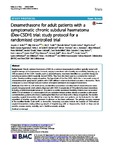Dexamethasone for adult patients with a symptomatic chronic subdural haematoma (Dex-CSDH) trial: study protocol for a randomised controlled trial
| dc.contributor.author | Kolias, AG | |
| dc.contributor.author | Edlmann, Ellie | |
| dc.contributor.author | Thelin, EP | |
| dc.contributor.author | Bulters, D | |
| dc.contributor.author | Holton, P | |
| dc.contributor.author | Suttner, N | |
| dc.contributor.author | Owusu-Agyemang, K | |
| dc.contributor.author | Al-Tamimi, YZ | |
| dc.contributor.author | Gatt, D | |
| dc.contributor.author | Thomson, S | |
| dc.contributor.author | Anderson, IA | |
| dc.contributor.author | Richards, O | |
| dc.contributor.author | Whitfield, Peter | |
| dc.contributor.author | Gherle, M | |
| dc.contributor.author | Caldwell, K | |
| dc.contributor.author | Davis-Wilkie, C | |
| dc.contributor.author | Tarantino, S | |
| dc.contributor.author | Barton, G | |
| dc.contributor.author | Marcus, HJ | |
| dc.contributor.author | Chari, A | |
| dc.contributor.author | Brennan, P | |
| dc.contributor.author | Belli, A | |
| dc.contributor.author | Bond, S | |
| dc.contributor.author | Turner, C | |
| dc.contributor.author | Whitehead, L | |
| dc.contributor.author | Wilkinson, I | |
| dc.contributor.author | Hutchinson, PJ | |
| dc.date.accessioned | 2019-11-25T21:46:45Z | |
| dc.date.issued | 2018-12-04 | |
| dc.identifier.issn | 1745-6215 | |
| dc.identifier.issn | 1745-6215 | |
| dc.identifier.other | 670 | |
| dc.identifier.uri | http://hdl.handle.net/10026.1/15183 | |
| dc.description | No embargo required. | |
| dc.description.abstract |
BACKGROUND: Chronic subdural haematoma (CSDH) is a common neurosurgical condition, typically treated with surgical drainage of the haematoma. However, surgery is associated with mortality and morbidity, including up to 20% recurrence of the CSDH. Steroids, such as dexamethasone, have been identified as a potential therapy for reducing recurrence risk in surgically treated CSDHs. They have also been used as a conservative treatment option, thereby avoiding surgery altogether. The hypothesis of the Dex-CSDH trial is that a two-week course of dexamethasone in symptomatic patients with CSDH will lead to better functional outcome at six months. This is anticipated to occur through reduced number of hospital admissions and surgical interventions. METHODS: Dex-CSDH is a UK multi-centre, double-blind randomised controlled trial of dexamethasone versus placebo for symptomatic adult patients diagnosed with CSDH. A sample size of 750 patients has been determined, including an initial internal pilot phase of 100 patients to confirm recruitment feasibility. Patients must be recruited within 72 h of admission to a neurosurgical unit and exclusions include patients already on steroids or with steroid contraindications, patients who have a cerebrospinal fluid shunt and those with a history of psychosis. The decision regarding surgical intervention will be made by the clinical team and patients can be included in the trial regardless of whether operative treatment is planned or has been performed. The primary outcome measure is the modified Rankin Scale (mRS) at six months. Secondary outcomes include the number of CSDH-related surgical interventions during follow-up, length of hospital stay, mRS at three months, EQ-5D at three and six months, adverse events, mortality and a health-economic analysis. DISCUSSION: This multi-centre trial will provide high-quality evidence as to the effectiveness of dexamethasone in the treatment of CSDH. This has implications for patient morbidity and mortality as well as a potential economic impact on the overall health service burden from this condition. TRIAL REGISTRATION: ISRCTN, ISRCTN80782810 . Registered on 7 November 2014. EudraCT, 2014-004948-35 . Registered on 20 March 2015. Dex-CSDH trial protocol version 3, 27 Apr 2017. This protocol was developed in accordance with the SPIRIT checklist. Available as a separate document on request. | |
| dc.format.extent | 0-0 | |
| dc.format.medium | Electronic | |
| dc.language | en | |
| dc.language.iso | en | |
| dc.publisher | Springer Science and Business Media LLC | |
| dc.subject | Chronic subdural haematoma | |
| dc.subject | Dexamethasone | |
| dc.subject | Neurosurgery | |
| dc.subject | Neurology | |
| dc.subject | Randomised control trial | |
| dc.title | Dexamethasone for adult patients with a symptomatic chronic subdural haematoma (Dex-CSDH) trial: study protocol for a randomised controlled trial | |
| dc.type | journal-article | |
| dc.type | Clinical Trial Protocol | |
| dc.type | Journal Article | |
| plymouth.author-url | https://www.webofscience.com/api/gateway?GWVersion=2&SrcApp=PARTNER_APP&SrcAuth=LinksAMR&KeyUT=WOS:000452337000005&DestLinkType=FullRecord&DestApp=ALL_WOS&UsrCustomerID=11bb513d99f797142bcfeffcc58ea008 | |
| plymouth.issue | 1 | |
| plymouth.volume | 19 | |
| plymouth.publication-status | Published | |
| plymouth.journal | Trials | |
| dc.identifier.doi | 10.1186/s13063-018-3050-4 | |
| plymouth.organisational-group | /Plymouth | |
| plymouth.organisational-group | /Plymouth/Faculty of Health | |
| plymouth.organisational-group | /Plymouth/Faculty of Health/Peninsula Medical School | |
| plymouth.organisational-group | /Plymouth/REF 2021 Researchers by UoA | |
| plymouth.organisational-group | /Plymouth/REF 2021 Researchers by UoA/UoA01 Clinical Medicine | |
| plymouth.organisational-group | /Plymouth/Research Groups | |
| plymouth.organisational-group | /Plymouth/Research Groups/FoH - Applied Parkinson's Research | |
| plymouth.organisational-group | /Plymouth/Research Groups/Plymouth Institute of Health and Care Research (PIHR) | |
| plymouth.organisational-group | /Plymouth/Users by role | |
| plymouth.organisational-group | /Plymouth/Users by role/Academics | |
| plymouth.organisational-group | /Plymouth/Users by role/Researchers in ResearchFish submission | |
| dc.publisher.place | England | |
| dcterms.dateAccepted | 2018-11-12 | |
| dc.rights.embargodate | 2021-1-12 | |
| dc.identifier.eissn | 1745-6215 | |
| dc.rights.embargoperiod | Not known | |
| rioxxterms.versionofrecord | 10.1186/s13063-018-3050-4 | |
| rioxxterms.licenseref.uri | http://www.rioxx.net/licenses/all-rights-reserved | |
| rioxxterms.licenseref.startdate | 2018-12-04 | |
| rioxxterms.type | Journal Article/Review |


